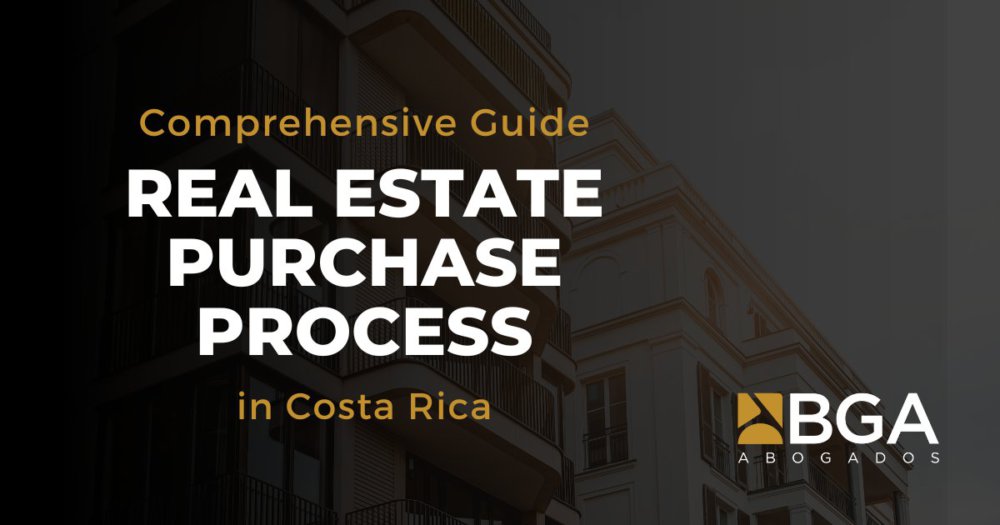Purchasing a property is undoubtedly one of the most significant and delicate moments in the life of any individual or family. It represents a substantial investment with long-lasting financial implications, often involving bank loans with terms extending up to thirty years.
The legal advice and recommendations we offer are numerous because the entire purchasing process involves various contracts, technical analyses, and studies to ensure that the property you are acquiring is free from any issues or contingencies in the future. Additionally, it ensures that the financing system or payment method used is appropriate for your circumstances and market conditions..
Property Purchase Process in Costa Rica
First Consideration: Purchase Alternatives
The first thing to consider is which of the three purchase alternatives you will use:
- Purchasing a house or apartment in a condominium;
- Purchasing a house or apartment not in a condominium; or
- Purchasing a lot or land where you will eventually build your house or apartment.
1. Purchasing a House or Apartment in a Condominium in Costa Rica
If you are buying in a condominium, several things need verification. Initially, a registry study is essential to check the status of the condominium, whether it is undergoing registration or transformation to horizontal property, or if the condominium is already registered as such.
It is imperative to verify with the Ministry of Economy, Industry, and Commerce of Costa Rica (MEIC) whether the condominium has the formal authorization required to market its units. This also implies that their reservation contracts, purchase options, sale promises, and formal sale contracts are duly authorized by this institution.
Without this formal requirement, it is not advisable to proceed with the purchase as it exposes you to significant risk.
Once confirmed that the condominium has MEIC’s approval, the next step is to review the condominium’s bylaws. This legal instrument establishes all conditions and rules for living, building, and managing the property.
The bylaws outline the use of common areas, activity schedules, specific rules for houses or apartments regarding external characteristics such as paint color and decoration, pet policies, whether the property can be subdivided, and all regulations governing the condominium.
The bylaws also regulate sanctions, including penalties and fines for non-compliance, which could even lead to loss of property, emphasizing the importance of taking this seriously.
Additionally, the bylaws detail construction regulations and condominium fees, specifying maintenance and security costs and all regulated by the condominium’s deed and its bylaws.
Carefully reviewing the bylaws is crucial to avoid inconveniences post-purchase. If the rules seem unreasonable or do not fit your family’s needs, it is reason enough to consider other options.
Once this is clear, you can proceed with reserving a unit by paying a deposit. This requires a legal document detailing the payment conditions, which can be a reservation form, a purchase option contract, or a sale promise contract. Each must clearly state the legal and business terms, including unit description, deadlines, financing options, business rules, and the handling of the deposit.
The document must specify if the deposit will apply to the price, serve as compensation for the developer in case of purchase finalization, and the conditions for refund or loss of the deposit. It should also detail the unit, common and private areas, and include storage, parking, or other amenities.
Upon formalizing the reservation, the next step is a thorough review of the legal documents to be signed at the price payment time. Whether the agreed period is three months, six months, a year, or upon condominium construction completion, detailed knowledge of financing possibilities is crucial.
Developers often partner with financial institutions to offer better credit terms to clients, but buyers can also seek their own financing.
For cash payments, dates and payment methods should be agreed upon, and the buyer can choose the public notary for the public deed and National Registry registration.
For financed payments, various options should be explored, including interest rates, terms, risks, insurance, and formalization costs, whether through a mortgage or a trust.
In Costa Rica, all these procedures must be conducted before a public notary. Banks or financial institutions usually appoint a trusted public notary for legal security reasons, with costs borne by the debtor. However, for cash payments, the buyer can appoint their trusted public notary.
2. Purchasing a House or Apartment Not in a Condominium in Costa Rica
For non-condominium houses, the first step is a registry verification to check the property’s legal status. This includes ensuring there are no annotations, liens, judicial notations, usufructs, possessions, or leases that could affect free disposition post-purchase.
It is also essential to verify that municipal taxes are up-to-date. Ideally, this analysis should be conducted by a trusted attorney to avoid post-purchase surprises.
This due diligence involves a technical and preventive analysis known as Real Estate Due Diligence, identifying current and imminent risks and contingencies. An expert attorney with a multidisciplinary team should conduct this analysis to ensure no issues affect the property, considering registry, municipal, and environmental aspects.
As with condominiums, any reservation, sale promise, or purchase option should be formalized in writing and in the presence of an attorney, detailing payment terms, deadlines, deposit conditions, applicable penalties, and indemnities in case of default.
For cash payments, the buyer can request the designation of their trusted public notary in Costa Rica for the transaction.
4. Purchasing a Lot or Land in Costa Rica
When purchasing land for future construction, a registry review is essential to ensure the lot has no legal issues. Additionally, a municipal verification known as land use certification is necessary to confirm construction permissions and limitations.
It is also crucial to check for restrictions on property disposition due to easements, power lines, water lines, environmental conditions, and zoning regulations.
Infrastructure developments should be considered to avoid future expropriation risks, affecting property value and usability. The land use certification will inform what can be built, dimensions, and timelines.
Without this Real Estate Due Diligence, one might purchase land unsuitable for construction, resulting in a poor investment impacting financial interests and credit history.
Once verified, follow the same steps and rules discussed previously. An option to purchase should detail all terms, rights, and obligations, and the final transaction should involve a public notary, whether for cash or financed payments.
For commercial interests, different rules and considerations apply, which will be discussed in another article.
Regardless of the investment type, consulting an expert real estate and commercial attorney before any initial payment is essential to conduct due diligence, minimizing risks and protecting present and future interests.
Legal Advice and Due Diligence
Before making any initial payment on a property, it is crucial to consult an expert lawyer for Due Diligence. This step ensures the property is free from any issues that could jeopardize your investment. Our experienced attorneys at BGA Abogados provide a comprehensive analysis and advice, taking into account all legal, municipal, and environmental factors.
Property Purchase Process in Costa Rica
Purchasing property in Costa Rica involves several critical steps to secure a safe and beneficial investment. Whether you are buying a condominium, non-condominium property, or land, thorough legal checks and professional advice are essential. By consulting with our real estate law experts, you ensure that all aspects of the transaction are covered, protecting both your investment and financial future.
At BGA Abogados, we specialize in Real Estate Due Diligence and property transactions, offering you the peace of mind that comes with expert legal guidance.
Article by Benjamin Gutierrez, Attorney and Notary Public in Costa Rica.
For further inquiries, please fill out the contact form with your details.

